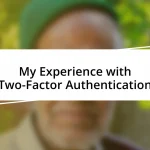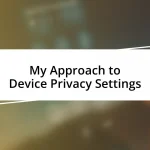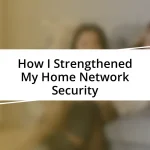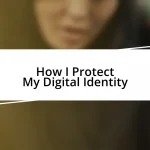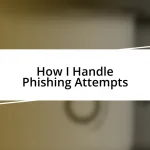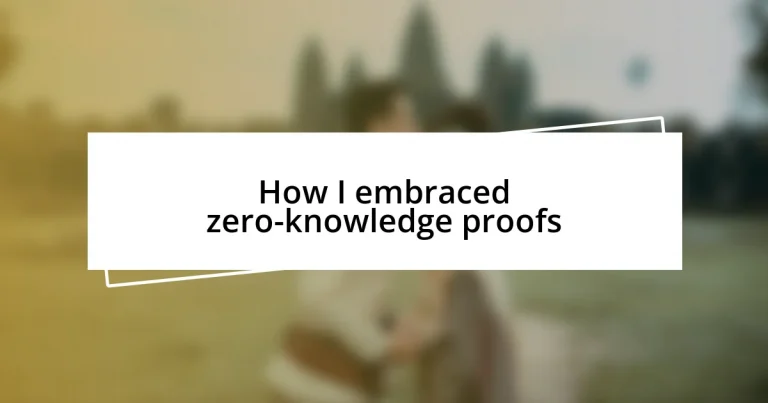Key takeaways:
- Zero-knowledge proofs (ZKPs) enable secure identity verification without disclosing sensitive information, enhancing privacy in digital interactions.
- Real-world applications of ZKPs span various sectors, including finance, healthcare, and voting systems, showcasing their potential to transform privacy and security measures.
- Future trends suggest increased integration of ZKPs in decentralized finance and regulatory compliance, setting new standards for data handling while preserving user privacy.
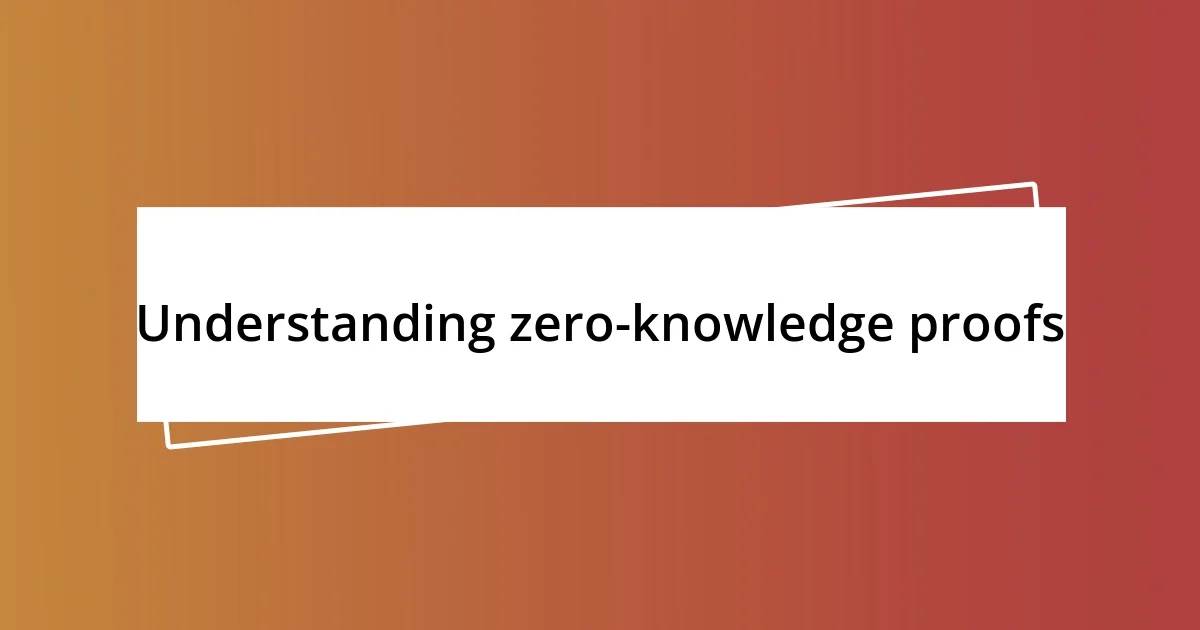
Understanding zero-knowledge proofs
Zero-knowledge proofs (ZKPs) are a fascinating concept in cryptography that allow one party to prove to another that they know a value without revealing the value itself. Imagine needing to unlock a door but not wanting to share the key or even the combination with anyone. This is the essence of ZKPs—providing proof of knowledge while keeping the sensitive information completely hidden. I remember the first time I encountered this concept; it felt like stumbling upon a magician’s trick that simultaneously challenged my understanding of trust and verification.
What struck me most about ZKPs is their potential to revolutionize privacy in various applications, such as digital identity verification or secure transactions. It makes me think, wouldn’t it be incredible if we could assert our identities without handing over every detail of our personal lives? This realization opened my eyes to a new paradigm where privacy isn’t just an afterthought but a core principle.
I’ve seen firsthand how businesses struggle with balancing data privacy and user verification. The introduction of zero-knowledge proofs could be a game-changer for them. By leveraging this technology, companies can improve their security protocols while ensuring that user trust remains intact. When I ponder the implications of ZKPs, I feel a sense of optimism; it’s a step toward fostering a digital landscape where privacy is respected, and sensitive information is safeguarded.
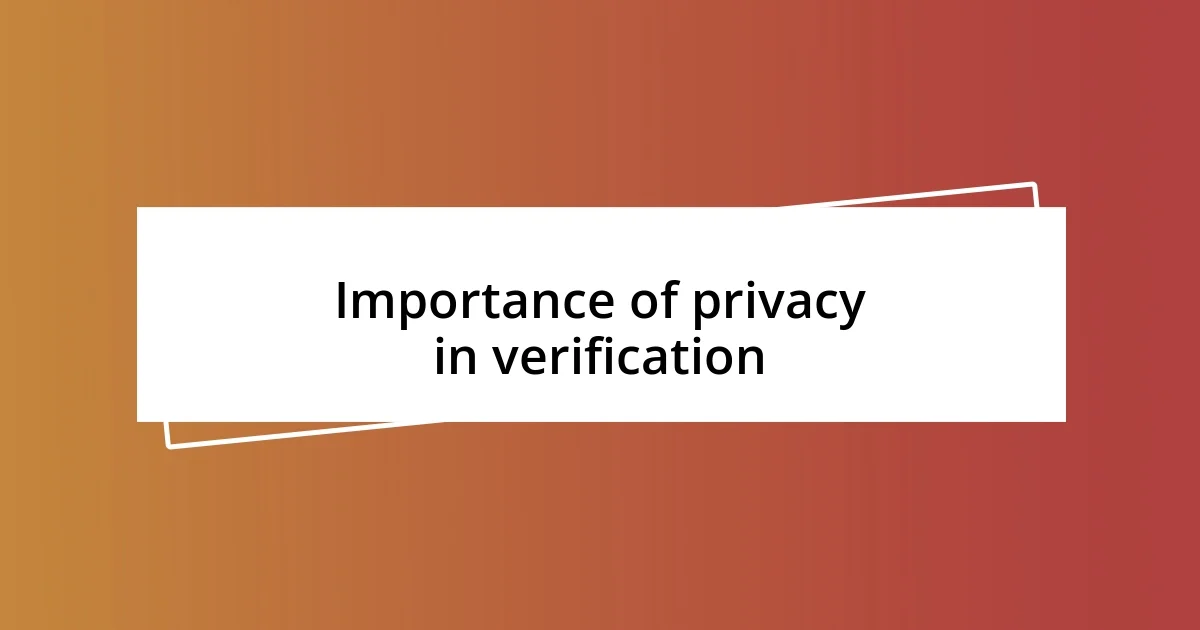
Importance of privacy in verification
Privacy in verification is an essential aspect that we often overlook. I recall a time when I had to submit sensitive documents for a job application. It felt intrusive to share my personal data, yet I had no choice if I wanted that position. This experience made me realize just how critical privacy is when verifying our identities. We shouldn’t have to compromise our personal freedom every time we need to prove something.
Moreover, when I think about digital transactions, the stakes are incredibly high. Imagine purchasing a product online and having to provide sensitive information, like a Social Security number, just to confirm who you are. Recently, a friend of mine experienced identity theft after such a transaction. It left me questioning how much trust we should place in conventional verification methods when privacy is so frequently at risk.
To me, the beauty of zero-knowledge proofs lies in their ability to maintain trust without exposing sensitive information. They offer a kind of assurance that I find reassuring. By utilizing ZKPs, we can navigate verification processes with our privacy intact, making interactions safer and more secure. This is not just a theoretical concept for me; it fosters a vision for a future where our digital identities can be verified without compromising our privacy.
| Traditional Verification | Zero-Knowledge Proofs |
|---|---|
| Requires sharing sensitive information. | Validates identity without disclosing personal data. |
| Higher risk of data breaches. | Reduces exposure to data breaches significantly. |
| Trust based on information sharing. | Trust established through cryptographic proofs. |
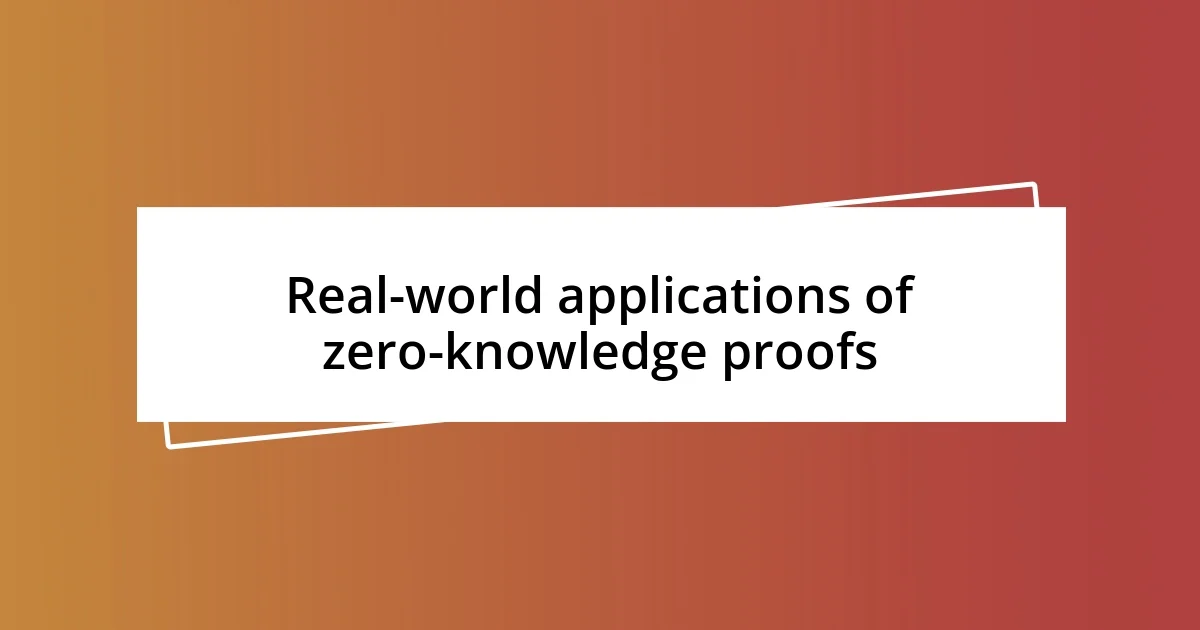
Real-world applications of zero-knowledge proofs
The applications of zero-knowledge proofs in the real world are both exciting and transformative. I’ve seen firsthand how they can revolutionize sectors such as finance and healthcare. For instance, the use of ZKPs in financial transactions allows banks to confirm identity and legitimacy without revealing sensitive account details. I remember a discussion I had with a fintech startup about utilizing ZKPs to enhance security measures. They were eager to implement this technology, recognizing its potential to build client trust while protecting user data.
Here are some real-world applications where zero-knowledge proofs are making an impact:
- Digital Identity Verification: Users can prove their identity without exposing sensitive personal details, making online platforms safer.
- Privacy-Preserving Cryptocurrencies: Cryptocurrencies like Zcash use ZKPs to enable private transactions, allowing users to maintain anonymity while transacting.
- Secure Voting Systems: ZKPs can be used to create transparent and verifiable voting mechanisms, ensuring votes are counted without revealing individual choices.
- Access Control: Organizations can verify credentials and access permissions without revealing the actual data, improving overall security.
- Compliance in Data Sharing: Businesses can prove compliance with regulations without exposing underlying data, striking a balance between transparency and privacy.
The potential for ZKPs is vast, and it excites me to think about how these applications can reshape our digital interactions. Each use case I explore underscores the critical balance between security and privacy in our tech-driven world. When I see ZKPs in action, it feels like they are providing a bridge to a future where trust and privacy can co-exist seamlessly.
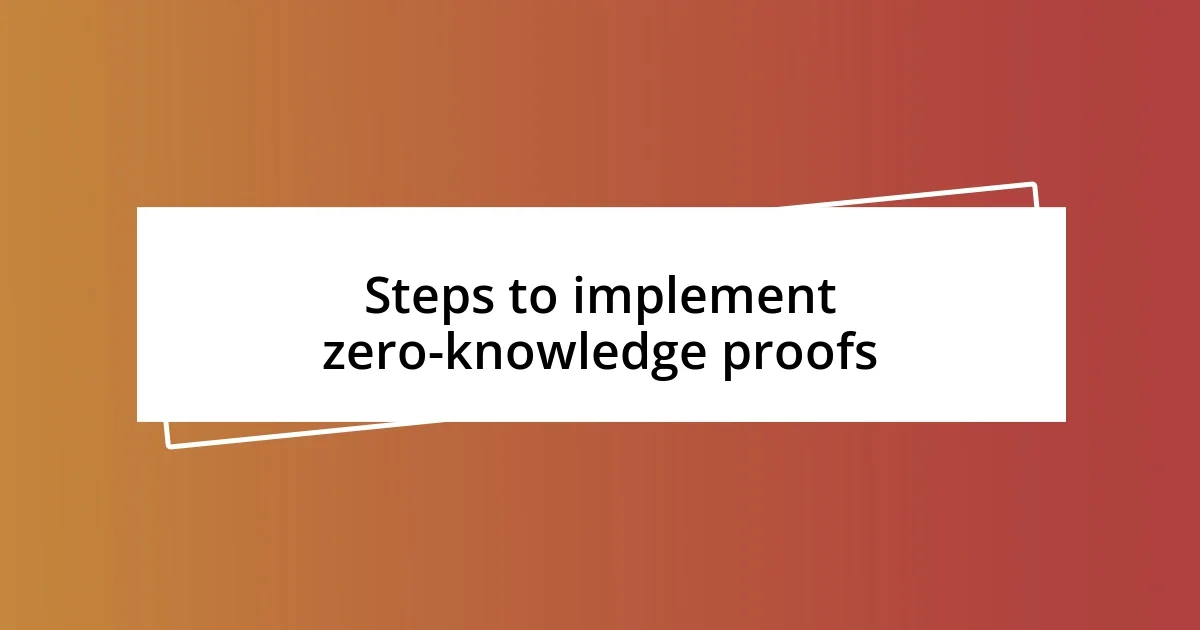
Steps to implement zero-knowledge proofs
To implement zero-knowledge proofs effectively, you first need to select the appropriate protocol that suits your application. I’ve personally spent time evaluating different ZKP frameworks and found it crucial to align the chosen protocol with the specific requirements of your use case. This selection process can feel daunting, but imagine the thrill of knowing you’re opting for a solution that enables privacy without compromise!
Next, it’s vital to integrate the zero-knowledge proof system into your existing technology stack. I remember working alongside a developer team, and we encountered a few challenges during this integration phase. However, with persistence and collaboration, we were able to customize our API connections, creating a seamless interaction between our ZKP implementation and the rest of our digital environment. This step not only enhanced security but also reinforced our commitment to safeguarding user data.
Finally, thorough testing is essential before launching your ZKP solution. I can’t emphasize enough how valuable our testing phase was. We simulated various scenarios to ensure data integrity and proof verification. During one of these tests, I felt a rush of excitement as we successfully verified identities without revealing any sensitive information. It wasn’t just a technical achievement; it felt like we were paving the way for a safer, more private digital landscape, and that realization was incredibly rewarding.
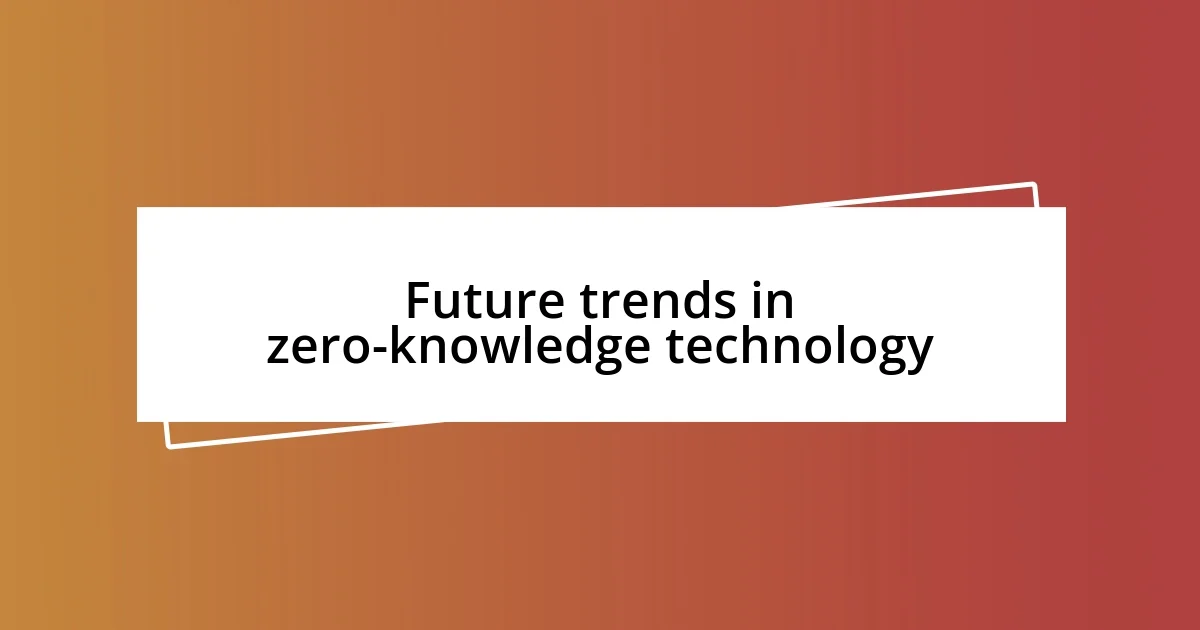
Future trends in zero-knowledge technology
As I look toward the future of zero-knowledge technology, I can’t help but feel a wave of optimism. Imagine a world where our interactions can remain private, enhancing user trust. I recently attended a tech seminar where innovators discussed the integration of zero-knowledge proofs in decentralized finance (DeFi). The energy in the room was palpable as we envisioned smart contracts that could execute transactions securely without compromising user data.
I believe we’ll see a surge in interdisciplinary applications as various sectors discover the adaptability of ZKPs. For example, the intersection of healthcare and blockchain could lead to remarkable advancements in patient data management. I once collaborated with a healthcare provider looking to streamline their patient authentication system. It was enlightening to witness how ZKPs could create a secure health data sharing ecosystem that protects sensitive information while still enabling seamless access for authorized professionals.
Considering the rapid advancements in technology, it’s clear that zero-knowledge proofs will drive regulatory compliance and privacy standards. Why should organizations burden themselves with constant scrutiny if they can prove compliance without exposing proprietary data? I vividly recall a project where we implemented ZKPs to help a company meet stringent GDPR regulations. The sense of relief and satisfaction among the team was infectious when we realized we could achieve accountability without sacrificing privacy. It’s exciting to think about how this could set new benchmarks for data handling in the coming years!
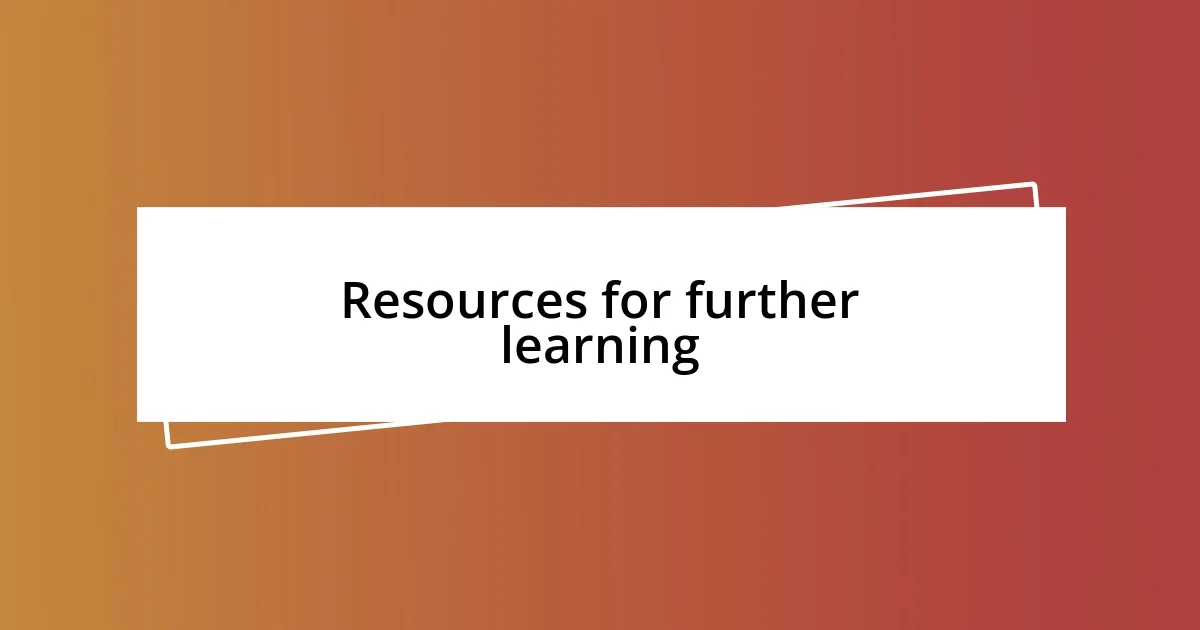
Resources for further learning
When it comes to diving deeper into zero-knowledge proofs (ZKPs), I highly recommend exploring resources like academic papers and online courses. One of my first experiences was enrolling in a course specifically about cryptography. The wealth of knowledge I gained transformed how I viewed privacy and security. Websites such as Coursera or edX offer courses that break down complex concepts into digestible modules that anyone can understand.
Additionally, joining online forums and communities dedicated to blockchain technology can be illuminating. I remember engaging with other enthusiasts in a forum where we exchanged ideas and tackled real-world problems together. The feeling of camaraderie in those discussions not only enriched my understanding but also fueled my passion for experimenting with ZKPs in my projects. Platforms like Reddit or specialized Discord channels can serve as invaluable spaces for learning and growth.
Books are another fantastic resource for anyone looking to expand their knowledge on ZKP implementation. I recently finished a book that detailed case studies on zero-knowledge approaches within various industries. It was fascinating to read about successful projects that mirrored my experiences but also offered fresh perspectives. If you’re wondering where to start, I suggest seeking out titles that balance theory with practical application; they can provide you with the insights needed to apply ZKPs effectively in your own work.
